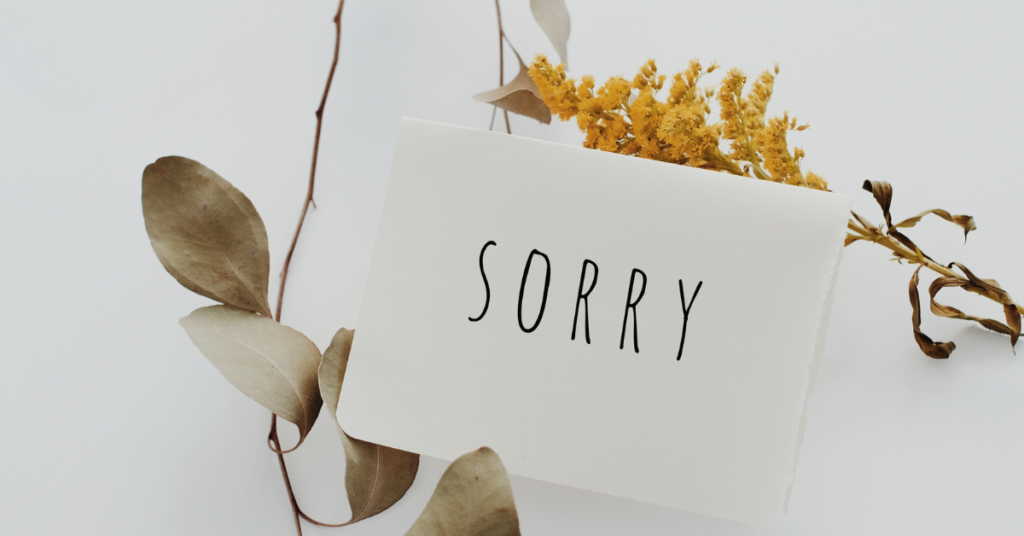Have you ever been in a situation where someone has done something that hurt or upset you, and they apologize, but you still feel like something is off? Or maybe someone has said something they didn’t mean to be hurtful, but it still negatively affected you? It’s a common experience, and it can be frustrating when you feel like the other person isn’t fully taking responsibility for their actions.
Apologies and good intentions are important, but they’re just the first step in repairing a relationship or rectifying a situation. It’s not enough to simply say, “I’m sorry,” and expect everything to be okay. In order for true healing and growth to occur, we need to take accountability for our actions and work towards making changes.
When we talk about accountability in relationships, we mean taking responsibility for our words, actions, and impact on others. This can be difficult, especially if we’ve made mistakes or hurt someone unintentionally. However, without accountability, we can’t truly connect with others in a deep and meaningful way.
So why is accountability so important?
Here are a few reasons…
1. It builds trust:
When we take responsibility for our actions, others are more likely to trust us. They know that we’re willing to admit when we’re wrong and that we value their feelings and experiences. This makes them more likely to open up to us and share their own vulnerabilities.
2. It fosters growth:
None of us are perfect, and we all make mistakes from time to time. However, when we take accountability for those mistakes, we can learn from them and grow. This allows us to deepen our relationships with others and become more resilient and empathetic.
3. It creates true connection:
Authentic relationships are built on mutual respect, understanding, and shared experiences. When we take accountability for our actions, we show that we’re willing to work with others to create these kinds of connections. This creates a sense of community and belonging that can be incredibly powerful.
Unfortunately, in some communities, especially in spiritual or self-development circles, there can be a tendency to avoid accountability. People may say things like “that’s just your opinion” or “I had good intentions and I didn’t mean to hurt you.” While it’s important to acknowledge that everyone’s experience is valid, it’s also important to take responsibility for our impact on others. If we don’t, we risk creating a one-sided dynamic that can’t sustain true connection.
To build authentic relationships, it’s essential for both parties to engage and take responsibility. We need to be willing to hear and understand each other’s perspectives, learn how to communicate, and work together to find solutions and create deeper connections. This requires vulnerability, honesty, and a willingness to be wrong sometimes. But when we take accountability for our actions, we can create relationships that are truly transformative and life-changing.
It’s also crucial to hold the other person accountable for their actions. If someone refuses to engage in dialogue or take responsibility for their behavior, it’s a big red flag. You deserve to be treated with respect and to be in mutually supportive relationships that value both people’s feelings and needs. It is important to set boundaries and get clear on what you will and will not tolerate in a relationship.
By acknowledging and taking responsibility for our actions, we create a safe and supportive space for growth, healing, and deeper connection. It’s important to recognize that relationships are a two-way street, and both parties have a responsibility to each other to create a healthy and fulfilling dynamic.
Next time you find yourself in a situation where an apology or good intentions aren’t enough, remember that taking accountability for your actions is the next step. It’s not always easy, but it’s a crucial part of the healing process and the foundation for creating true connection and understanding.
If you are struggling in your relationships or would like to improve your communication skills and build healthier connections, I offer 1:1 support. Unfortunately, these essential skills are often overlooked in our education system, and society as a whole is still learning how to communicate effectively. In a world where there is so much polarity, division, and conflict, it can be difficult to know how to navigate relationships in a healthy way. It’s important to remember that communication is not a one-size-fits-all approach and depends heavily on context. If you’re finding it challenging to communicate or build meaningful relationships, please know that it’s not your fault. However, there is a way to learn and grow and create fulfilling connections with others.

